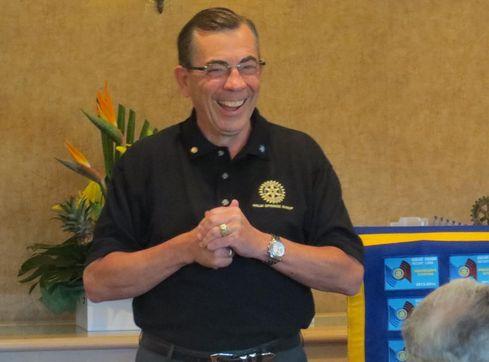Retired CIOs: 5 Rewarding Second Acts
Some CIOs "retire" but then consult. These five decided to do something completely different.


IT's 10 Fastest-Growing Paychecks
IT's 10 Fastest-Growing Paychecks (Click image for larger view and slideshow.)
Is there life after information technology leadership? You bet. While some "retired" CIOs immediately dive back into the industry as consultants to those currently serving as CIOs, others decide it's time to do something completely different.
InformationWeek specifically went looking for people who had an interesting "Second Act" story to tell. Of our five examples, one is embarking on a career of voiceover work and acting after years of using funny voices to amuse (and sometimes annoy) his colleagues. Another is working almost as hard as a volunteer civic leader as he did in his former profession (but without the stress of worrying about the next system outage). Several are actively trying to relax but are still active as volunteers. Another retired as a university CIO but immediately went to work as a professor -- a role she plans to return to as soon the current and very different act in her play concludes.
Growing in retirement
Ed Meachen, who retired as CIO of the University of Wisconsin System in 2012, said he knows retired higher education CIOs who now lead symposiums on IT leadership, but that was not for him. "I decided that I would do something completely different that I have a passion for. I was delighted that my time was finally my own -- that I owned my time," he said.
That passion was gardening, something he had invested time in all along on nights and weekends (sometimes coming into the office at 6:00 a.m. so he could get work done when things were quiet and justify cutting out at 4:00 p.m.). This is not a small hobby for him -- he owns 43 acres, including his own vineyard. "I would never trade working outside in the summer for work again," Meachen said. "It's just so incredibly Zen to work outside all summer long."
Not content to simply Zen out, he upped the ante by getting trained as a Master Gardener, a certified volunteer for the state agricultural service. Master Gardeners help educate the public and answer questions on things like recognizing native versus invasive plants or the proper versus harmful uses of pesticides and fertilizers. "I did it partly as a challenge to myself -- to find out whether, at 65 years old, I could learn anything completely new," he said.
Figure 1:  Ed Meachen with a bumper crop of brussel sprouts.
Ed Meachen with a bumper crop of brussel sprouts.
The education helped him tend his own garden better, but just as importantly it introduced him to a lot of new friends, people he never would have met otherwise. Because of his history of executive leadership, before long he was drafted as president elect of the Dane County Master Gardener Association. Just recently, the incumbent resigned and he was named president, a volunteer administrative role he expects to require about 10 to 15 hours a week of his time, on average, but one he is enjoying because it gives him an opportunity to meet more people who share his passion for gardening.
Meachen was the university system CIO, coordinating with CIOs at different campuses, from 1997 to June 2012. Before that, he was the first CIO at University of Wisconsin-Parkside, where he had previously been Library Director -- part of a generation of higher education CIOs who learned information technology as an extension of their library science training.
He said he does miss the camaraderie and the experience of leading a team. For about a year after retirement, he would go to bed and dream that he still had his old job and hadn't yet been replaced. "I guess it took me a year to decouple after working 15 years in that job," he said. "I thoroughly enjoyed the job; it was just a great job."
Still, on the occasions when he has been offered opportunities to take on executive or consulting roles, he is happy to turn them down.
"There's nothing more important to me than having ownership of your time. You can waste it, if you want, but it's yours," Meachen said.
Cracking wise
"Effective 8/15/14 I will be retired from Federal service," reads the blurb atop the LinkedIn profile of Ron Bianchi, who until recently was CIO of the Economic Research Service at the US Department of Agriculture. "I will be pursuing part time consulting opportunities as well as my acting and voiceover careers!"
Voiceover career? Listen for yourself. This serious executive is capable of being a very silly man, spouting imitations and accents, little boy and old man voices. Did he ever use funny voices to break the tension at work?
"Are you from the NSA?" he asked in a phone interview, before segueing into a line of patter in an Australian accent. "So, yes, sometimes I would crack wise that way."
Actually, he found it to be a technique better indulged in when he was sure he was among friends. "Not everyone is equally accepting of it," he said. Some people would judge him as someone who didn't take his job very seriously if he went too Mel Blanc on them. At one retirement party, he and some friends put on a whole James Bond-themed skit but not everyone was amused. "I could tell the division director thought it was scene stealing or something," he said.
For as long as he can remember, Bianchi found it easy to pick up accents or do imitations. Yet as a young man, he generally wasn't brave enough to act -- except for one time at William and Mary College when he got to play Ben Franklin in a production of 1776. That was back in 1976, the year he graduated and went on to law school -- putting his theatrical ambitions on ice for a couple of decades. He didn't get back to it until 1992, performing in a community theater production of A Funny Thing Happened on the Way to the Forum. "As soon as I got my first laugh, I was hooked," he said.
As his professional life advanced, community theater was hard to fit in, but he carved out time to do about a play a year. He also began to pick up occasional paying gigs in commercials and corporate video. Recently, he has won roles in a couple of TV pilots (which may or may not go anywhere) and has begun approaching acting as a profession -- although still more for fun than for money. "I do it for the enjoyment of it; that's far and away the most important. There's not a lot of money in it, except for the 1%."
Having just moved from the D.C. area to Suffolk, Virginia, he figured voiceover work was something he could do -- and certainly audition for -- from anywhere.
Meanwhile, he has not necessarily sworn off IT work forever. Having formerly been active in IDG's CIO Executive Council, he is currently considering rejoining as an emeritus member as "a way of giving back." Besides, if they ever need an emcee, he knows how to be entertaining.
Civic leader
Before he entered the corporate world as a CIO, Robert Moon was already retired from an IT leadership career in the US Navy, finishing at the rank of Commander back in 1994. His last military posting was at the Office of Naval Research. His most recent commercial CIO roles were at Viewsonic, the educational toy company LeapPad, and virtual school operator K12 Inc. After retiring from K12 in 2011, Moon finally got to spend some time at his "permanent" home in Palm Springs (which for years he had only been able to visit on weekends).
Immediately, he went back to work, albeit as a volunteer and civic leader. After the voters approved Measure J, which provided for a 1% sales tax to fund needed investments in the city's infrastructure, Moon was appointed to serve on the Measure J Commission, which oversees how that money is spent. The other commissioners elected him the commission's first chairman in 2012. This proved to be the first in a series of civic organizations he was invited to join and, before long, invited to lead.
Figure 2:  Robert Moon speaks to the Rotary Club of Palm Springs in his role as Measure J Commission Chairman
Robert Moon speaks to the Rotary Club of Palm Springs in his role as Measure J Commission Chairman
In none of those roles has he made significant use of IT specific skills, and yet his professional experience is very relevant to why he has been successful in these roles, he said. "When you're a CIO, you really have to reach out to customers and end users and understand what do they want, what do they need, and how do they work?" He finds himself doing much the same work in civic life.
"Actually, as a CIO I could not have built a server if my life depended on it," Moon admitted. He was far enough removed from the actual implementation of technology that his real skills involved having "a Ph.D. in PowerPoint" and the speaking skills to convince the board to invest millions in his plans on the basis of a 10-minute presentation. Those skills are equally valuable for making a case for the value of Measure J to the public and other civic organizations.
Thinking of Meachen, I asked if he ever considered puttering around the garden instead. "Working in the garden is not me," he scoffed. "One thing most CIOs share is a Type A personality, almost obsessive-compulsive -- you don't survive as a CIO without a certain amount of obsessive compulsive personality. I knew if I had to go from all ahead flank to full stop, I would go nuts."
He listed so many volunteer activities that I wondered if he was working as hard or harder than when he was collecting a salary. No, not quite: maybe 30 or 40 hours per week, as opposed to the 60- or 70-hour workweeks
of his former life. Maybe more significantly, there is a big difference in the stress level involved. Even when on vacation, he used to live on his laptop and his BlackBerry, anxious about what might be going on in his absence.
"One of the things as a CIO is you feel such a sense of responsibility and proprietorship of these systems that keep the corporation going. Your entire life as a CIO is dedicated to keeping them up keeping them functioning. Downtime is not acceptable," Moon said. "Today, I'm applying some of the same skill sets but I don't have to worry that because a system goes down a $1.3 billion company can't operate."
He remembers one time at Viewsonic where a database administrator's error shut down a central Oracle system for six hours, during which basic functions like shipping and receiving couldn't operate. "That was the longest six hours of my life," Moon said. "So this is much more fun."
His dilemma is he's been successful enough that now he is being urged to run for office. While he is proud and ambitious enough to be tempted, he also has to think twice, he said. "My life is so perfect now. Do I really want to screw with it?"
Going way, way beyond retirement
When I met Joy Hughes at conference of higher education technology leaders, she was on the verge of retiring from the George Mason University CIO's office, but she had no intention of leaving the university. Instead, she was going to teach in the university's school of engineering. We also recruited her as an occasional InformationWeek contributor.
Turns out her absence from an executive role didn't last. When I looked her up, I was surprised to learn that she was now interim president and provost at a George Mason University in Korea. This outpost is part of the Incheon Global Campus located in Songdo, Incheon, Korea. Songdo promotes itself as the country's high tech "city of the future" and has invited multiple American universities to replicate their programs here. SUNY's computer science program arrived three years ago, Mason launched economics and management in March, the University of Utah just started up in September with public health, psychology, and social services programs. The University of Ghent, from Belgium, has also launched a biosciences program.
"I was asked to take on the role of president because of my long history with China and much shorter history with Korea, my role as founding executive director of 4-VA (a partnership of four Virginia universities supported by the Virginia government and Cisco's CEO), and also because of my involvement in designing the IT facilities for the Songdo campus," Hughes explained via email.
"I am interim because I am way, way past retirement age, at least the age to retire from administration," she added. She is staying for a year while assisting in the search for a permanent president. "Once he or she is hired, you will find me in my Fairfax classroom, marker in hand, drawing equations on the white board for my students."
In other words, she does not plan to start a true rocking chair retirement anytime soon.
Picture perfect
Jerry Johnson gets together with some of his former coworkers about once a month to shoot pool. They tell him about work, and he tells them how happy is not to be doing it anymore. "I have very little passion for that work environment at all anymore," he said.
Johnson retired about a year ago as chief information officer at the Pacific Northwest National Laboratory. Prior to that, he often shared his thoughts with InformationWeek and was a member of our advisory board. Johnson said thought he might be one of those people who finds himself drawn back into consulting or some other IT role after retirement, but temptation never struck.
"That's not to say I didn't love my job -- it was a wonderful career," he said. While he was in the job, he was passionate about doing it well, meaning he could work 12 or 14 hours a day and come home still loving his job. "The secret is carrying forward that passion in whatever you do," he said. "You need to be passionate while you're working so you succeed in your job, but you also need to be passionate in retirement and, frankly, in your family life."
One of his longtime passions has been international travel. Although he actually hasn't done any of that in the past year, it was following an adventure travel visit to Manchu Picchu that he stumbled on another enthusiasm. When he realized the best photo he'd taken on the trip was with his iPhone, he decided it was time to get a real camera and learn how to use it.
"I reached out to a friend who was knowledgeable about photography and started buying new cameras, new lenses. I wound up with a digital mirror-less camera that would be good for adventure travel because it's about half the weight of an SLR," Johnson said. He now attends a new photography workshop about once a week and is active in a photography club where he has made many new friends.
"It's rare that someone asks, 'What did you do before you retired?' " he said, but they do care about the photos, and people are impressed by how far he has advanced in about 11 months. On the other hand, some of the people who knew him as an IT guy say they are surprised that he is so creative. The sad thing there is that IT is a creative business but most people don't see that, he said. "They confuse being creative with being artistic."
Johnson is another retiree who devotes a fraction of his energy into volunteer and charitable causes, sitting on the boards of The ARC, a social services organization for people with mental or developmental disabilities, Catholic Family Child Services, and Columbia Basin Dive Rescue, for which he is the board president.
Like others on this list, Johnson finds his CIO experience translates well into volunteer leadership. For example, as The ARC is struggling with cuts in public funding, he has taken on a business development role seeking out new sources of revenue to make up the shortfall and also provide employment for some of the agency's clients who are able to work. He has even been able to make that dovetail with his enthusiasm for photography, working on a video promotion for The ARC.
What's his advice to those CIOs coming up on retirement?
"The best advice is do it," Johnson said. "I've yet to meet anyone who said I wish I had worked longer." Yes, there is a period of adjustment. For the first few months, Johnson found he kept himself working hard at the kind of home improvement chores he used to do over the weekend -- as if retirement was going to be one endless and exhausting weekend. "I had to tell myself, hey, you don't have to get all this stuff done right away. You have to seek some sort of balance," he said.
InformationWeek's new Must Reads is a compendium of our best recent coverage of project management. Learn why enterprises must adapt to the Agile approach, how to handle project members who aren't performing up to expectations, whether project management offices are worthwhile, and more. Get the new Project Management Must Reads issue today. (Free registration required.)
About the Author(s)
You May Also Like







